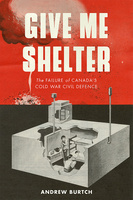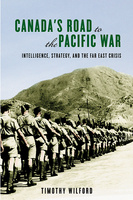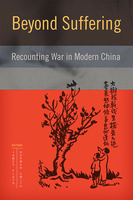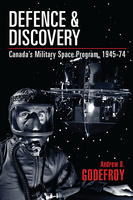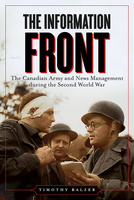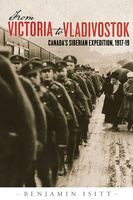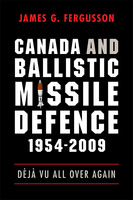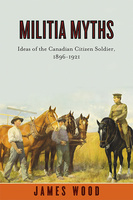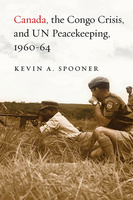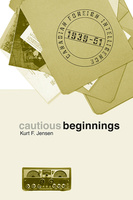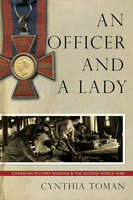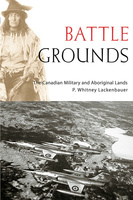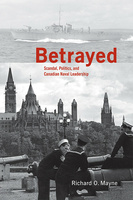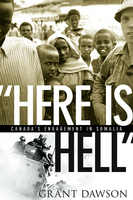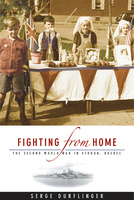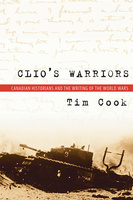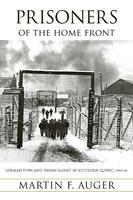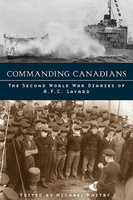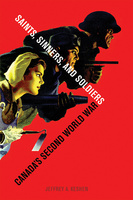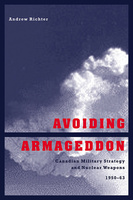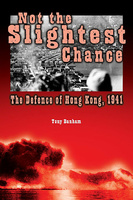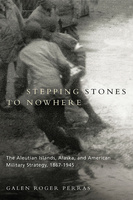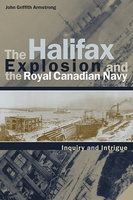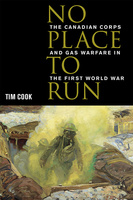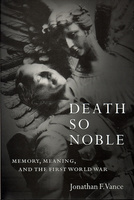Give Me Shelter
The Failure of Canada’s Cold War Civil Defence
Give Me Shelter is a revealing examination of Canada’s efforts to prepare its citizens to face nuclear war, from 1945-63.
Canada's Road to the Pacific War
Intelligence, Strategy, and the Far East Crisis
An intriguing account of Canada’s role as a Pacific power during the crisis that led to war with Japan.
Corps Commanders
Five British and Canadian Generals at War, 1939-45
Corps Commanders explains how five very different Second World War British and Canadian generals fought their battles, and why they fought them in similar fashion.
Beyond Suffering
Recounting War in Modern China
This collection moves beyond the geopolitical sphere to examine the multiple fronts – personal, social, and institutional – on which wars in modern China have been fought, experienced, and remembered.
Defence and Discovery
Canada’s Military Space Program, 1945-74
A revealing investigation into the origins, development, and impact of Canada’s space program from 1945 to 1974.
The Information Front
The Canadian Army and News Management during the Second World War
The first book on the public relations efforts of the Canadian Army during the Second World War.
From Victoria to Vladivostok
Canada’s Siberian Expedition, 1917-19
Uncovers the forgotten story of the Canadian Siberian Expeditionary Force – sent to Russia in 1918 as part of an Allied intervention to defeat Bolshevism – despite the objections of many Canadians who were sympathetic to the goals of the Russian Revolution.
Canada and Ballistic Missile Defence, 1954-2009
Déjà Vu All Over Again
This insightful book offers an explanation for Canada’s uncertain response to US ballistic missile defence initiatives from the 1950s to the present.
Militia Myths
Ideas of the Canadian Citizen Soldier, 1896-1921
Militia Myths traces the cultural history of the citizen soldier from 1896 to 1921, an ideal that lay at the foundation of how Canadians experienced and remember the First World War.
Veterans with a Vision
Canada’s War Blinded in Peace and War
Illuminates the challenges faced by Canada’s war-blinded veterans and outlines the history of the Sir Arthur Pearson Association of War Blinded, an advocacy group for all Canadian veterans and blind citizens.
Pearson's Peacekeepers
Canada and the United Nations Emergency Force, 1956-67
Pearson’s Peacekeepers describes Canada’s role in the first peacekeeping effort mounted by the UN and uncovers realities, and challenges, that lie beneath the myth of Canada’s peacekeeping mission.
Canada, the Congo Crisis, and UN Peacekeeping, 1960-64
Canada, the Congo Crisis, and UN Peacekeeping, 1960-64 reveals the complex web of influences that shaped Canada’s relationship with Africa and its involvement in UN peacekeeping.
The Politics of Procurement
Military Acquisition in Canada and the Sea King Helicopter
A history of failed attempts to replace the Sea King maritime helicopter reveals the political nature and shortcomings of the Canadian defence procurement process.
Kiss the kids for dad, Don’t forget to write
The Wartime Letters of George Timmins, 1916-18
The letters of Lance-Corporal George Timmins, who served in the Canadian Expeditionary Force on the Western Front, offer a rare glimpse into the life and relationships, at home and abroad, of an ordinary Canadian soldier.
Cautious Beginnings
Canadian Foreign Intelligence, 1939-51
A convincing portrait of Canada's active role in Second World War intelligence gathering.
Crisis of Conscience
Conscientious Objection in Canada during the First World War
The first and only book about the Canadian pacifists who refused to fight in the Great War.
An Officer and a Lady
Canadian Military Nursing and the Second World War
Cynthia Toman analyzes how gender, war, and medical technology intersected to create a legitimate role for women in the masculine environment of the military and explores the incongruous expectations placed on military nurses as “officers and ladies.”
A Leaf upon the Sea
A Small Ship in the Mediterranean, 1941-1943
Here is the tale of the smallest surface ships in the Mediterranean Sea front of World War II, and the naval officers who played vital roles in making possible the successes of the larger squadrons.
Russia in Pacific Waters, 1715-1825
A Survey of the Origins of Russia's Naval Presence in the North and South Pacific
Gunboat Frontier
British Maritime Authority and Northwest Coast Indians, 1846-1890
Gunboat Frontier presents a different interpretation of Indian-white relations in nineteenth-century British Columbia, focusing on the interaction of West Coast Indians with British law and authority.
“Here Is Hell”
Canada's Engagement in Somalia
One of the first scholarly examinations of the Somalia operation, this book will undoubtedly play a seminal role in informing further scholarly debate on this important period in Canada’s military and diplomatic past.
Fighting from Home
The Second World War in Verdun, Quebec
A comprehensive, at times intimate, portrait of Verdun and Verdunites, both English and French, during the Second World War.
Clio's Warriors
Canadian Historians and the Writing of the World Wars
Acclaimed historian and author Tim Cook (At the Sharp End) analyses where the practice of academic military history has come from and where it needs to go.
Journalism of Attachment
Dutch Newspapers during the Bosnian War
Drawing on an extensive content analysis of news coverage about the Bosnian war, this study describes the phenomenon of “journalism of attachment” as reflected in Dutch newspapers covering the Bosnian war.
Prisoners of the Home Front
German POWs and "Enemy Aliens" in Southern Quebec, 1940-46
Detailing the day-to-day affairs of Germans civilians and POWs in Canadian internment camps camps during the Second World War, this book fills an important void in our knowledge of the Canadian home front.
Commanding Canadians
The Second World War Diaries of A.F.C. Layard
Commander A.F.C. Layard, RN, wrote almost daily in his diary from 1913 until 1947. The pivotal 1943-45 years of this edited volume offer an extraordinarily full and honest chronicle, revealing Layard’s preoccupations, both with the daily details and with the strain and responsibility of wartime command at sea.
Hometown Horizons
Local Responses to Canada's Great War
Alive with personal stories, this book considers how people and communities on the Canadian home front perceived the Great War.
The Soldiers' General
Bert Hoffmeister at War
A complex, analytical yet accessible portrait of Bert Hoffmeister, who won more awards than any Canadian officer in the Second World War.
Fight or Pay
Soldiers' Families in the Great War
In Fight or Pay, Desmond Morton turns his eye to the stories of those who paid in lieu of fighting – the wives, mothers, and families left behind when soldiers went to war.
The Red Man's on the Warpath
The Image of the "Indian" and the Second World War
This book explores how wartime symbolism and imagery propelled the “Indian problem” onto the national agenda, and why assimilation remained the goal of post-war Canadian Indian policy – even though the war required that it be rationalized in new ways.
Saints, Sinners, and Soldiers
Canada's Second World War
From labour conflicts to the black market to prostitution, this book examines the moral and social underbelly of Canada’s Second World War.
Canadians Behind Enemy Lines, 1939-1945
A history of the activities and lives of undercover Canadian operatives in Europe and Asia during World War II.
Frigates and Foremasts
The North American Squadron in Nova Scotia Waters 1745-1815
A meticulously researched and groundbreaking study of the activities and motivations of the British Navy on North America’s eastern seabord.
Avoiding Armageddon
Canadian Military Strategy and Nuclear Weapons, 1950-1963
An examination of Canadian military thinking on key issues of the nuclear age, such as deterrence, arms control, strategic stability, air defence, and the domestic acquisition of nuclear weapons.
Not the Slightest Chance
The Defence of Hong Kong, 1941
This book represents the first attempt to piece together all existing accounts of the December 1941 Battle of Hong Kong and the fighting between the Garrison and the invading Japanese.
A War of Patrols
Canadian Army Operations in Korea
Impeccably researched and analytical, this comprehensive account of the Canadian campaign in the Korean War provides the first detailed study of the training, leadership, operations, and tactics of the brigade under each of its three wartime commanders.
Stepping Stones to Nowhere
The Aleutian Islands, Alaska, and American Military Strategy, 1867-1945
Galen Perras shows how that changed with the Japanese occupation of the western Aleutians, which climaxed in the horrendous battle for Attu during the Second World War.
Scars of War
The Impact of Warfare on Modern China
A forceful look at the long-term social and psychological impact of warfare on modern China’s civilian population.
No Place to Run
The Canadian Corps and Gas Warfare in the First World War
This book is a reevaluation of the Canadian Corps and poison gas in WWI. It examines how the Canadian Corps organized and protected its soldiers from poison gas.
Another Kind of Justice
Canadian Military Law from Confederation to Somalia
The first historical survey of Canadian military law, providing insights into military justice in Canada, the purpose of military law, and the level of legal professionalism within the Canadian military.
Death So Noble
Memory, Meaning, and the First World War
This book examines Canada’s collective memory of the First World War through the 1920s and 1930s. It is a cultural history, considering art, music, and literature.
Objects of Concern
Canadian Prisoners of War Through the Twentieth Century
Jonathan Vance examines Canada's role in the formation of an important aspect of international law, traces the growth and activities of a number of national and local philanthropic agencies, and recounts the efforts of ex-prisoners to secure compensation for the long-term effects of captivity.
Ships and Memories
Merchant Seafarers in Canada's Age of Steam
An account of life on steamships, this book draws on the experiences of seafarers in peace and war and during the depression.
The Great War of Words
British, American and Canadian Propaganda and Fiction, 1914-1933
The hitherto unknown story of the secret collaboration between the government and leading writers of the early 1900s – including H.G. Wells, John Buchan and John Galsworthy – to create a propaganda machine against the invading Huns.

